Author: Steve Crum
‘The Life Ahead’ showcases Loren & Gueye in intense human drama
 By Steve Crum
By Steve Crum
The other day I rewatched a favorite Sophia Loren film, Boy on a Dolphin, a literally colorful 1957 flick in which she co-starred with Alan Ladd. Loren was 23 then, and an emerging Hollywood star. Four years later, she had emerged big time with her Best Actress Oscar for Two Women. Now, after decades of accolades and awards for her movie work, Loren stars in The Life Ahead, her first feature since 2009’s Nine.
At 86 years, Sophia Loren returns in a triumphant, Oscar worthy performance.
In a rework of 1977’s Madame Rosa with Simone Signoret in the title role (based upon The Life Before Us by Romain Gary), Loren portrays Rosa, a 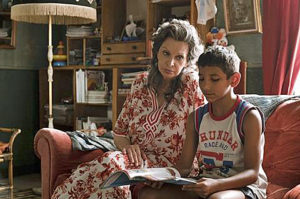 Jewish Holocaust survivor and former prostitute. Unlike Signoret’s French take, this Rosa is Italian—with English subtitles, by the way.
Jewish Holocaust survivor and former prostitute. Unlike Signoret’s French take, this Rosa is Italian—with English subtitles, by the way.
Loren’s son, Edoardo Ponti, both directed and co-wrote the screenplay.
The story involves the elderly Rosa, referenced as “Madame Rosa,” who has for years retired to a rather meager life of caretaking the children of local Bari, Italy prostitutes. (Filming was in Bari.) But she is content, and helps raise her wards with strict, often religious, conviction. In fact, one of her current two children is a Jewish boy Rosa teaches Hebrew.
 The plot focuses early on to a 12 year-old street thief/drug pusher named Momo, vividly played by Ibrahima Gueye. Madame Rosa crosses his path when he steals her bag in the plaza, and knocks her down. It is beyond a challenge when she reluctantly agrees with her kind Dr. Cohen (Renato Carpentieri) to take him into her home. Momo is an orphaned Senegalese immigrant child who has hardened to living on the streets.
The plot focuses early on to a 12 year-old street thief/drug pusher named Momo, vividly played by Ibrahima Gueye. Madame Rosa crosses his path when he steals her bag in the plaza, and knocks her down. It is beyond a challenge when she reluctantly agrees with her kind Dr. Cohen (Renato Carpentieri) to take him into her home. Momo is an orphaned Senegalese immigrant child who has hardened to living on the streets.
Momo’s stubbornness to Rosa is adamant: “I don’t want to be like other kids!”
Various conflicts and hourly challenges occur as Momo maintains his street smarts behind the stern but loving  back of Rosa. Momo becomes comfortable around his new “family,” which includes a boy his age as well as a toddler girl. The girl’s mother, Lola (Abril Zamora), is Rosa’s best friend as well as a working woman of the street.
back of Rosa. Momo becomes comfortable around his new “family,” which includes a boy his age as well as a toddler girl. The girl’s mother, Lola (Abril Zamora), is Rosa’s best friend as well as a working woman of the street.
Rosa’s health takes a downturn, putting her in frequent catatonic states…and Momo’s stead slowly changes to caretaker. The transformation does not occur easily. Thanks to an incisive screenplay and sensitive direction, realism prevails.
Mention must be made of Babak Karimi’s sensitive portrayal of Hamil, a local shop owner who befriends Momo at 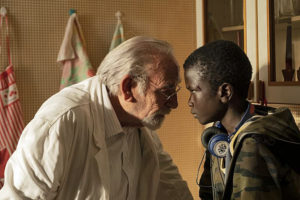 Rosa’s insistence.
Rosa’s insistence.
The Life Ahead is a wonderfully crafted character study of Rosa and Momo, both of whom fight the inevitable sad truths of the world.
∞∞∞∞∞
GRADE on an A-F Scale: A-
‘Palmer’ is terrific, heartfelt vehicle for Justin Timberlake, Ryder Allen
 By Steve Crum
By Steve Crum
A movie like Palmer could not have been green lighted ten or even five years ago. Maybe not even a couple of years past. But here it is—a difficult and heartwarming story about a young man who is dealing with others accepting his gender non-conforming preferences.
The twist here is the young man is actually a very young boy of seven years. The boy, Sam, is magnificently portrayed by first-time actor Ryder Allen.
Palmer is also a wrenching story about neglect and love.
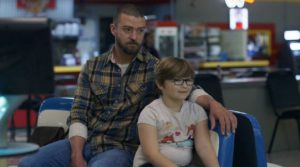 Director Fisher Stevens is a jack of multiple TV and movie trades (actor, director, producer), including co-producing The Cove (2009), an Oscar winning documentary. Stevens is more familiar to me as attorney Marvin Gerard in TV’s The Blacklist. The original screenplay for Palmer is by Cheryl Guerriero.
Director Fisher Stevens is a jack of multiple TV and movie trades (actor, director, producer), including co-producing The Cove (2009), an Oscar winning documentary. Stevens is more familiar to me as attorney Marvin Gerard in TV’s The Blacklist. The original screenplay for Palmer is by Cheryl Guerriero.
Justin Timberlake believably portrays Eddie Palmer, who returns to his small Louisiana hometown after 12 years in prison. (He was imprisoned for nearly killing a guy in an argument.) The ex-convict moves in with his Grandmother Vivian (the always great to see June Squibb), who lives in a modest old house.
 In contrast to Eddie’s younger days, he is now settled and even tempered. He is definitely happy to be with his grandmother. Along comes Sam, the young son of Shelly (Juno Temple), who live next door in a trailer. Shelly and her abusive boyfriend are druggies/alcoholics who take trips out of town, leaving Sam with Vivian for sometimes weeks at a time. Vivian clothes and feeds Sam, as well as helping him catch the daily school bus. At school, Sam is lucky to have an understanding teacher, Maggie Hayes (Alisha Wainwright).
In contrast to Eddie’s younger days, he is now settled and even tempered. He is definitely happy to be with his grandmother. Along comes Sam, the young son of Shelly (Juno Temple), who live next door in a trailer. Shelly and her abusive boyfriend are druggies/alcoholics who take trips out of town, leaving Sam with Vivian for sometimes weeks at a time. Vivian clothes and feeds Sam, as well as helping him catch the daily school bus. At school, Sam is lucky to have an understanding teacher, Maggie Hayes (Alisha Wainwright).
The routine drastically changes when Vivian suddenly dies. Eddie’s rehabilitation truly begins when he recognizes the need for Sam to have an adult at home totally in his corner. Eddie is reluctant at first, but cares more and more for Sam as the days go on in the absence of Sam’s mom.
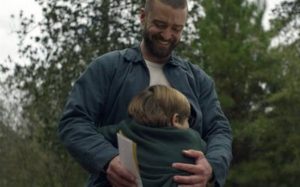 Complicating matters is Sam’s tendency to only play in little girls’ games, including dolls. Bullying abounds. You get the picture.
Complicating matters is Sam’s tendency to only play in little girls’ games, including dolls. Bullying abounds. You get the picture.
Enter Child Protective Services, and complications—as they say—ensue.
Palmer is obviously a low budget endeavor, particularly noting that Timberlake is not known as a box office draw for his acting. But the acting and powerful storytelling belie expectations. See it, and you will be impressed. Timberlake underplays terrifically.
Although Palmer is sometimes uneasy to watch, its uplifting pluses make it so worthwhile.
∞∞∞∞∞
GRADE on an A-F Scale: A-
Despite its stellar cast plus Broadway credentials, big budget ‘The Prom’ disappoints
 By Steve Crum
By Steve Crum
The Prom is based on Broadway’s The Prom, and is all about going to the prom. That is simply and repetitively put. While it is reminiscent of high school-set musicals like Grease and even Hairspray, The Prom is a lesser, distant cousin. Add to that disappointing.
Considering The Prom’s stellar cast and production credentials, it is doubly disappointing.
Check out the star roster: Meryl Streep, James Corden, Nicole Kidman, Keegan-Michael Key, Andrew Rannells, Ariana DeBose, and Kerry Washington. Despite their valiant tries, they are working with a predictable, mediocre script by Bob Martin and Chad 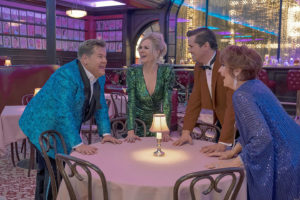 Beguilin, who also wrote the Broadway production. What does not help is a forgettable score by Matthew Sklar and David Klotz. The 131-minute running time belies expectations.
Beguilin, who also wrote the Broadway production. What does not help is a forgettable score by Matthew Sklar and David Klotz. The 131-minute running time belies expectations.
With a string of successful TV shows he created and produced (Glee, American Horror Story, Nip-Tuck among them), Emmy and Tony winner Ryan Murphy directed and produced The Prom.
So why does the film fall short? The answer is overproduction and slickness.
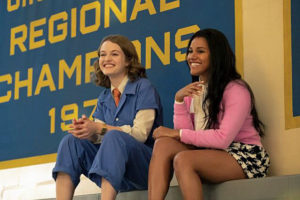 Using a plot device not so dissimilar to 1984’s Footloose, a midwestern small town (Edgewater, Indiana) prohibits a senior female student, Emma Nolan (Jo Ellen Pellman) of James Madison High School from taking her female girlfriend to the prom. In Footloose, the entire community banned any rock music and dancing from invading their high school territory. Although The Prom’s nemesis is PTA head Mrs. Greene (Kerry Washington), community parents hop on her bandwagon—emphasis on BANdwagon. No way will gayness be accepted. Although the principal (Keegan-Michael Key) supports Emma, he gives in to parental pressure.
Using a plot device not so dissimilar to 1984’s Footloose, a midwestern small town (Edgewater, Indiana) prohibits a senior female student, Emma Nolan (Jo Ellen Pellman) of James Madison High School from taking her female girlfriend to the prom. In Footloose, the entire community banned any rock music and dancing from invading their high school territory. Although The Prom’s nemesis is PTA head Mrs. Greene (Kerry Washington), community parents hop on her bandwagon—emphasis on BANdwagon. No way will gayness be accepted. Although the principal (Keegan-Michael Key) supports Emma, he gives in to parental pressure.
Cut to Broadway. A pair of self-centered, aging stars who have seen better days are despairing over the opening night closing of what they both hoped to be a comeback musical. Their show, Eleanor! The Eleanor  Roosevelt Story, is a super flop. For what it is worth, just the thought of an Eleanor Roosevelt musical amounts to the movie’s biggest laugh.
Roosevelt Story, is a super flop. For what it is worth, just the thought of an Eleanor Roosevelt musical amounts to the movie’s biggest laugh.
The two retreat to a nearby bar, and find solace in two out-of-work actors, played by Andrew Rannells and Nicole Kidman. The four soon discover the Emma story on Twitter, unite, and travel to Indiana as a self-serving publicity angle to take up her cause.
A whole lotta singing and dancing about love, acceptance, and sexual equality follows via enthusiastic production numbers performed by Streep, Corden, Kidman, Rannells, and company.
The song titles reflect such: Changing Lives, The Acceptance Song, Love Thy Neighbor, Tonight Belongs To You, and on and on. Nothing hummable.
Wow, The Prom glitters! But by its upbeat finale, we are reaffirmed that there is no gold amongst the glitter.
∞∞∞∞∞
GRADE on an A-F Scale: C-
George Clooney, Felicity Jones help make ‘The Midnight Sky’ plausible sci-fi
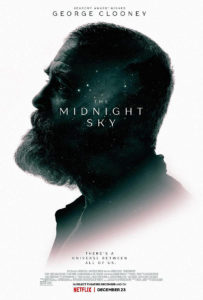 By Steve Crum
By Steve Crum
Of The Midnight Sky’s nearly two hour running time, George Clooney’s Augustine Lofthouse singly and brilliantly occupies over half. It is a task that speaks highly of Clooney the actor AND director. I say “singly” even though there is the inclusion of a preteen stowaway not long after the story opens. Let me clarify that he is the only one speaking. (This will be explained.)
Clooney gives a nuanced, somber performance which comes to life during a pair of action sequences that involve blinding snow, cracking ice, and frigid water. Be aware that the blizzard shooting occurred on location in Iceland during 50-mile-per-hour winds at 40 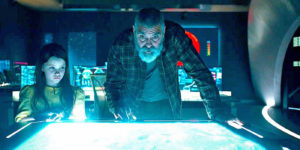 below 0. Call it enhanced, reactionary acting.
below 0. Call it enhanced, reactionary acting.
Mark L. Smith’s screenplay, based upon Lily Brooks-Dalton’s book, Good Morning, Midnight, tells the story of brilliant scientist Lofthouse in 2049. He is all alone on Earth after the surviving population has space-shipped out to Jupiter’s habitable K-23 moon for survival.
The gray bearded scientist is slowly dying, as shown by his daily health regimen. Through flashbacks of 30-plus years, we discover the young Lofthouse (Ethan Peck) had a romantic relationship with Jean Sullivan (Sophie Rundle), which ended due to choosing between career and marriage. As Lofthouse indulged in his professional passion, he became increasingly self-centered and unable to bond with other humans. Decades later, the loner is now truly alone.
 A plot turn drastically changes things when Lofthouse discovers a frightened little girl, later identified as Iris (Caoilinn Springall), hiding in his store room. Seemingly unable to speak, Iris reluctantly communicates with the old man through visual prompts like drawings and (gulp) peas. She becomes his sidekick of sorts, accompanying him throughout the Arctic structure as well as a terrifying snowmobile trip to a distant antenna shed. They grow fond of each other, and more dependent.
A plot turn drastically changes things when Lofthouse discovers a frightened little girl, later identified as Iris (Caoilinn Springall), hiding in his store room. Seemingly unable to speak, Iris reluctantly communicates with the old man through visual prompts like drawings and (gulp) peas. She becomes his sidekick of sorts, accompanying him throughout the Arctic structure as well as a terrifying snowmobile trip to a distant antenna shed. They grow fond of each other, and more dependent.
Act 2 focuses on the spacecraft Aether, which is nearing the earth after being away on an exploratory mission, unaware their planet is undergoing disaster. Crew members are having their own challenges, including an asteroid shower which imperils them as well as the ship’s structure. Add to that a newly discovered pregnancy.
It all adds up to much more than what might sound like an outer space soap opera. Earth is uninhabitable, except for  dying scientist Augustine. So now what to do? Clooney, as well as the entire Aether crew, make the implausible plausible. That is a credit to their acting. Kudos to Felicity Jones as Dr. Iris “Sully” Sullivan—on board the ship, and her fellow astronauts, played by David Oyelowo, Tiffany Boone, Demián Bichir, and Kyle Chandler.
dying scientist Augustine. So now what to do? Clooney, as well as the entire Aether crew, make the implausible plausible. That is a credit to their acting. Kudos to Felicity Jones as Dr. Iris “Sully” Sullivan—on board the ship, and her fellow astronauts, played by David Oyelowo, Tiffany Boone, Demián Bichir, and Kyle Chandler.
A fine score, featuring reflective violin and piano, is by the great Alexandre Desplat. Martin Ruhe’s cinematography is stunning.
The Midnight Sky has a heartbreaking finale preceded by grief, melancholy, regret, isolation, and repressed love.
∞∞∞∞∞
GRADE on an A-F Scale: A-
Clever, fast-paced ’Palm Springs’ is no déjà vu of ‘Groundhog Day’
 By Steve Crum
By Steve Crum
I have to admit I disliked Palm Springs from the outset. How dare any film have the audacity to redo the classic 1993 Groundhog Day! How could the comparatively paltry Andy Samberg attempt  to outdo or even equal Bill Murray? After the first 15 minutes, I calmed down and accepted what was really happening in Palm Springs. It takes the Groundhog Day set-up, and branches out in a half-dozen zany, original directions. It becomes much more than a re-imagining.
to outdo or even equal Bill Murray? After the first 15 minutes, I calmed down and accepted what was really happening in Palm Springs. It takes the Groundhog Day set-up, and branches out in a half-dozen zany, original directions. It becomes much more than a re-imagining.
And it is well worth seeing, folks.
Palm Springs is accurately studio-described as a sci-fi romantic comedy. First of all, it involves three individuals stuck in a time loop that is linked to a cave in the California desert near downtown Palm Springs. (I suppose the location would also be considered Palm Springs.) That means the same day repeats itself for the three unfortunates. These three are: Nyles (Andy Samberg), Sarah Wilder (Cristin Milioti) and Roy Schlieffen (J. K. Simmons).
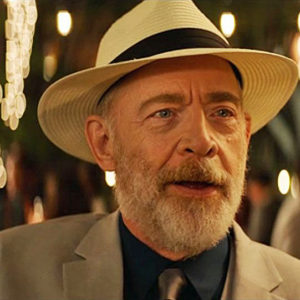 The target date, the repeated target date, is Nov. 9. It is the wedding day of Tala Anne Wilder (Camila Mendes) and Abe Schlieffen (Tyler Hoechlin). Notably, Peter Gallagher and June Squibb are cast as family members. Present for the festivities is Nyles, the boyfriend of Tala’s bridesmaid, Misty (Meredith Hagner).
The target date, the repeated target date, is Nov. 9. It is the wedding day of Tala Anne Wilder (Camila Mendes) and Abe Schlieffen (Tyler Hoechlin). Notably, Peter Gallagher and June Squibb are cast as family members. Present for the festivities is Nyles, the boyfriend of Tala’s bridesmaid, Misty (Meredith Hagner).
At the reception, Nyles interrupts the wedding speeches with an impromptu rambling that diverts attention from maid-of-honor Sarah’s speech—who is not only too shy to speak but drunk. It then segues to the desert, after Nyles and Sarah have become fast acquaintances if not friends.
So begins a time warp journey that at first only involves Nyles and Roy and bows and arrows. Thanks to a mysterious cave vortex nearby, the curious Sarah gets involved.
The cleverness of Max Barbakow’s direction blended with the originality of Andy Siara’s screenplay result in a fast-paced, extremely diverting 90 minutes. Although the love relationship between Nyles and Sarah seems inevitable from the get-go, it is fraught with problems as the same day is repeated—under  varying circumstances—over and over.
varying circumstances—over and over.
Samberg and Milioti make a great team, playing off each other superbly.
J. K. Simmons is up for the goofiness of it all, and adds fine support.
Matthew Compton’s jaunty title tune and score are a plus.
“Life can be a little less mundane with you in it,” Sarah tells Nyles. Palm Springs is anything but mundane.
∞∞∞∞∞
GRADE on an A-F Scale: A-
